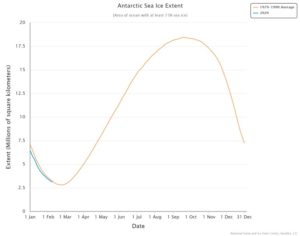by Cap Allon, February 10, 2020 in Electroverse
According to official government data from the National Snow & Ice Data Center (NSIDC), Antarctic Sea Ice Extent is currently tracking the 1979-1990 average:

In addition, Jan 2020’s extent exceeded that of 2019, 2018, 2017, 2016, 2011, 2007, 2006, 2005, 2000, 1997, 1993, 1992, 1988, 1985, 1984, 1981, and 1980.
NO CORRELATION BETWEEN CO2 AND SEA ICE EXTENT
Since 1979 — the year sea ice satellite measurements began — CO2 readings taken at the Mauna Loa Observatory in Hawaii have been on an unnaturally linear rise. While, during the same period, Antarctic Sea Ice Extent has been “extremely variable” with “the yearly minimum hitting both record highs and lows” — NOAA (climate.gov)…
by Jim Steele, February 9, 2020 in WUWT
…
…
The current context for the Antarctica Peninsula is that for over a decade it has experienced cooling temperatures driven by natural variability. In fact, glaciers in Esperanza’s region have also expanded. Esperanza’s record temperature simply happened due to foehn winds despite a cooling trend. Unfortunately, the media would rather scare the public to promote a climate crisis, than honestly educate them about the causes of natural climate variability.
by L.M. Lombrana, February 8, 2020
in NotaLotofPeopleKnowThat/Bloomberg
When one day’s weather is climate!
Paul Homewood
(Bloomberg) — The temperature at one research base in Antarctica reached a record-breaking 18.3 degrees Celsius (65 Fahrenheit) on Thursday, almost a full degree above the previous high set five years ago.
Argentine scientists on the Esperanza base who confirmed the reading said that wasn’t the only record broken this week. The nation’s Marambio site registered the highest temperature for the month of February since 1971. Thermometers there hit 14.1 Celsius, above the previous February 2013 reading of 13.8 Celsius.
The reports are shocking, but not surprising, said Frida Bengtsson, who is leading a expedition to the Antarctic for the environmental group Greenpeace.
…
La géologie, une science plus que passionnante … et diverse

